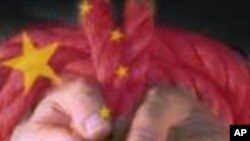According to the latest International Religious Freedom Report, which was issued by the State Department on September 19, the Chinese government continued to restrict religious practice to government-sanctioned organizations and registered religious groups and places of worship. The Chinese government also worked to control the growth and scope of activity of both registered and unregistered religious groups, including so-called "house churches."
The International Religious Freedom Report noted that during the reporting period the Chinese government’s repression of religious freedom intensified in some areas, including in Tibetan areas and in the Xinjiang UighurAutonomous Region. The government continues to try to limit the participation of Muslims in the Hajj and reportedly pursued the forcible return of several Uighur Muslims living abroad, some of whom had reportedly protested restrictions on the Hajj and encouraged other Muslims to pray and fast during Ramadan.
During the reporting period, followers of Tibetan Buddhism face greater restrictions on the practice of their religion. “Patriotic education” campaigns in the Tibetan Autonomous Region and other Tibetan areas required monks and nuns to sign statements personally denouncing the Dalai Lama. This and other new regulations imposed over the last year were major factors leading to the peaceful protests at a number of monasteries on March 10, 2008 that eventually devolved into rioting by Tibetan protesters and a violent police crackdown in Lhasa.
Some Christians continued to struggle to freely worship in China. Underground Roman Catholic clergy faced repression for their loyalty to the Vatican, which the Chinese government claims interferes in the country’s internal affairs. Some unregistered Protestant churches reported intensified harassment from government authorities leading up to the 2008 Summer Olympic Games. In June, several prominent religious activists and leaders, including attorneys, were placed under surveillance, restricted to their homes, or forced to leave Beijing during the visit of a delegation of foreign officials.
As President George Bush said during his visit to Beijing during the Olympic games, “no state, man or woman, should fear the influence of religion.” The United States continues to encourage China’s leaders to allow greater freedom to practice and express their religious beliefs. “The most basic freedom a man can have,” said President Bush, “is the right to worship his own God as he sees fit.”
The International Religious Freedom Report noted that during the reporting period the Chinese government’s repression of religious freedom intensified in some areas, including in Tibetan areas and in the Xinjiang UighurAutonomous Region. The government continues to try to limit the participation of Muslims in the Hajj and reportedly pursued the forcible return of several Uighur Muslims living abroad, some of whom had reportedly protested restrictions on the Hajj and encouraged other Muslims to pray and fast during Ramadan.
During the reporting period, followers of Tibetan Buddhism face greater restrictions on the practice of their religion. “Patriotic education” campaigns in the Tibetan Autonomous Region and other Tibetan areas required monks and nuns to sign statements personally denouncing the Dalai Lama. This and other new regulations imposed over the last year were major factors leading to the peaceful protests at a number of monasteries on March 10, 2008 that eventually devolved into rioting by Tibetan protesters and a violent police crackdown in Lhasa.
Some Christians continued to struggle to freely worship in China. Underground Roman Catholic clergy faced repression for their loyalty to the Vatican, which the Chinese government claims interferes in the country’s internal affairs. Some unregistered Protestant churches reported intensified harassment from government authorities leading up to the 2008 Summer Olympic Games. In June, several prominent religious activists and leaders, including attorneys, were placed under surveillance, restricted to their homes, or forced to leave Beijing during the visit of a delegation of foreign officials.
As President George Bush said during his visit to Beijing during the Olympic games, “no state, man or woman, should fear the influence of religion.” The United States continues to encourage China’s leaders to allow greater freedom to practice and express their religious beliefs. “The most basic freedom a man can have,” said President Bush, “is the right to worship his own God as he sees fit.”




